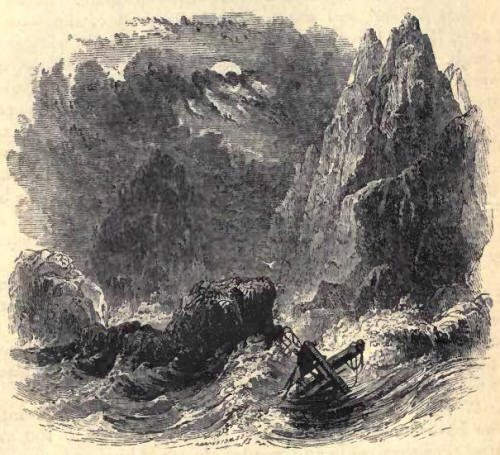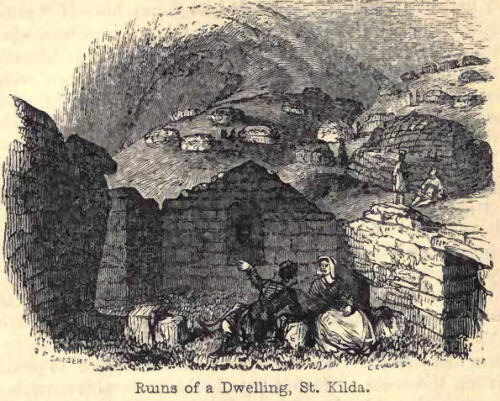|

"But oh, o'er all, forget not
Kilda's race,
On whose bleak rocs, which brave the wasting tides,
Fair Nature's daughter, Virtue, yet abides.
Go? just as they, their blameless planners trace!
Then to my ear transmit some gentle son°,
Of those whose lives are yet sincere an plain,
Their bounded walks the rugged cliffs along,
And all their prospect but the wintery main.
With sparing temperance at the needful time
They drain the scented spring, or, hunger prest,
Along the Atlantic rock, undreading, climb,
And of its eggs despoil the Solan's nest.
Thus blest in primal innocence, they live
Sufficed and happy with their frugal fare,
Which tasteful toil and hourly danger give.
Hard is their shallow soil, and bleak and bare;
Nor ever vernal bee was heard to murmur there?''
COLLINS.
ST. KILDA.
General description,
1.—houses; Inhabitants, 2.—Fowling, 3.
1. This remote islet of the
ocean
Whose lonely race
Resign the setting sun to Indian worlds
merits at our hands some
separate notice, as it has been occasionally made the object of a steam-boat
expedition. It lies in latitude 57° 50', and about eighty miles west of the
Butt of Lewis, Harris being the nearest land. The tourist wishing to visit
it, will find in the island of Pabba, at the extremity of the Sound of
Harris, a small-colony of fishermen, who are quite accustomed to make the
voyage to St. Kilda in their large open boats, and who will readily agree to
go there, provided they are allowed to judge of the weather, and conduct the
excursion entirely in their own way. But the detention in St. Kilda, from
stress of weather, is at times most tedious, and it may be believed that a
prolonged stay in such a locality is far from an agreeable occurrence. If
possible, therefore, it should be visited by a steamer or government cutter.
The island is about three
miles long by two in breadth, and it is girt all round with perpendicular
precipices, which in one part attain a height of 1300 or 1400 feet, and in
which there is but one landing-place, on the south-cast side, of difficult
access, except in very calm weather, and whence a narrow passage leads to
the summit of the high rocks above.
2. Within a quarter of a mile
of this inlet, the inhabitants, who have numbered for the last century, from
90 to 100, are closely congregated in an irregular cluster of huts or
houses, in general built of loose stones, about five feet in height, and
composed of great masses, usually from four to six feet in thickness,
thatched with straw. Their beds, or rather places of repose, are, for the
winter and spring months, in a recess within the thick walls, where a
quantity of fog, without any covering, is laid. They are nearly flat-roofed,
resembling from a little distance a Hottentot kraal, except that they have
not the regularity which marks the kraal. Every but is nearly inaccessible
from the filth which lies before its door, consisting of putrid sea-fowl,
and refuse of all disgusting kinds. The interior is scarcely better,
consisting generally of two apartments, one being divided from the other by
a rude partition of loose stones, within which is the dunghill, composed of
alternate strata of

feathers, ashes, dried turf,
and mould, which the inhabitants water, tread, and beat into a hard floor,
on which they kindle their fires, new strata being added from time to time,
and the whole gradually growing into a pile of compost, which is removed
once a-year to the tilled ground adjoining. The stench, both inside and
outside, it may well be conceived, is intolerable. Their personal
cleanliness is upon a par with that of their houses. Their squalid attire,
slovenly habits, and diminutive stature gives them a mean appearance, which
is, however, somewhat redeemed by an expression of countenance considerably
intelligent, and lighted up with curiosity and kindness. They are a
simple-minded race, with few sources of emotion ; but the emotions
themselves are vivid and strong. The mortality among the infants is
excessive. Out of ten children born, not more than one survives the ninth
day, probably in a great measure owing to the mephitic air which the
new-born infant is compelled to breathe ; together with the deleterious
food, melted butter and milk, with which they are at first fed. The
clergyman's duties appear to be strictly confined to religious matters. The
magisterial duties devolve upon the only individual in the island (with the
exception of the minister) who speaks the English Ianguage, and who is
employed by the proprietor as ground-officer to collect the feathers, &c.,
which are given by the natives in lieu of rent, and who terms himself "
Baron Bailie," and has a bench erected at one side of the village, where he
holds courts once a-week, and dispenses justice liberally. They store their
feathers, eggs, &c., in long stone cells, of which the courses incline
inwards in a sort of arch, and the whole covered with turf. The manse and
church are both respectable buildings.
A verdant turf covers most of
the island, giving way, on the higher elevations, to moss ; and the soil is
good, and, as far as it is cultivated, the ground is prepared with
considerable care with the spade, a rake or harrow, and mallet, and it is
highly manured, and the crops are early ; but catching wild-fowl is the
favourite pursuit, and is practised in various ways.
3. Each fowling party
consists of four persons, and each party has at least one rope, about thirty
fathoms long, of a threefold cord of strong raw cow-hide prepared for the
purpose, or of horse hair; and it is covered with dressed sheepskin, to
protect it from the rocks. Such a rope is the most valued article of
property—is made the subject of testament, and forms a dowry for a daughter.
The fowler at times descends the cliffs, suspended by the rope, which two or
three persons hold above. The person capturing the birds has a piece of wood
or branch, similar to a common fishing-rod, to the end of which there is a
piece of hair-line, about a foot in length, formed into a running noose,
which he places over the head of the bird, and by pulling it towards him,
the noose tightens upon the bird's neck, which he then unfastens, and takes
in another; or linked together in couples, each having the end of the cord
fastened about his waist, they clamber along the face of the precipices.
When one is in motion, the other plants himself on a strong shelf, and takes
care to have so sure a footing that, should his fellow adventurer make a
false step, he may be able to arrest his headlong career. When one has
arrived at a safe landing-place, he seats himself firmly, while the other
endeavours to follow. The Bolan geese are taken in great numbers at night,
and the mode of their capture is peculiar. By their daily exertions in quest
of their finny prey, to get a proper view of which the bird rises high in
the air, they are disposed to sleep soundly, and roost in large flocks, over
which one stands sentinel. The islanders, aware from the play of fish during
the day, where the birds will betake themselves to rest, let themselves down
in their neighbourhood with profound silence. The fowler has a white towel
about his breast, and calmly glides along till he comes in view of the
sentinel; he then gently moves forward on his hands and feet, creeping very
silently up to the sentinel bird, from whose croak he knows whether to
advance or retire. The fowler is said then very gently to tickle one of the
bird's legs, which he lifts and places on the palm of the hand, and the
other in like manner. Ike then imperceptibly moves it to the first sleeping
bird, which he pushes with his finger, on which, thus rudely disturbed in
its slumbers, it immediately falls a-fighting with the sentinel. This alarms
the others, but instead of flying away, they all set to fight pell mell with
one another, while the common enemy, unsuspected, twists their necks with
all expedition. It is said that 1200 have been disposed of in this way by a
single party in the course of a night. Dr. M`Culloch, in his own style, says
of St. Kilda,—"The air here is full of feathered animals, the sea is covered
with them, the houses are ornamented by them, and the inhabitants look as if
they had been all tarred and feathered, for their hair is full of feathers,
and their clothes are covered with feathers. The women look like feathered
Mercuries, for their shoes are made of a gannet's skin; everything smells of
feathers." |

